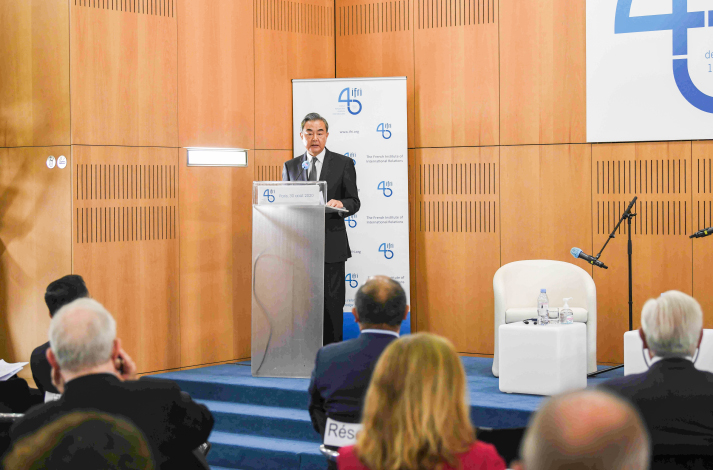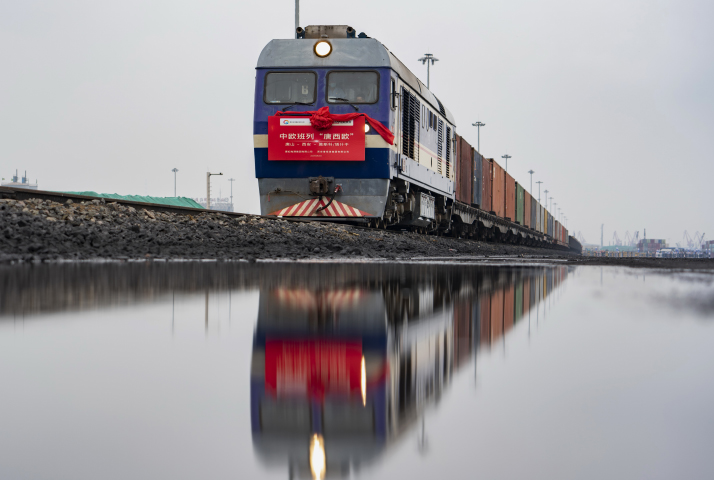| Opinion |
| Chinese FM's visit signals enhanced collaboration with European countries amid pandemic | |
|
|
 Wang Yi, Chinese State Councilor and Foreign Minister, delivers a speech at the French Institute of International Relations in Paris, France, on August 30 (XINHUA)
 The first quarter of 2020 found the world in shock. The novel coronavirus disease (COVID-19) pandemic disrupted daily activities and required unprecedented lockdowns. The nature of international diplomatic activity changed for some months. Online meetings largely replaced face-to-face interactions. The EU-China leaders' meeting, for example, could not take place as scheduled in April and was organized in a virtual form in June. It was the first time Chinese President Xi Jinping had met—though not face to face—with the new EU leadership, President of the European Council Charles Michel and President of the European Commission Ursula von der Leyen.
Two months after the summit, Chinese State Councilor and Foreign Minister Wang Yi followed the usual pre-COVID-19 practice and traveled to Europe. This was his first overseas visit after he attended a special meeting between foreign ministers of China and member states of the Association of Southeast Asian Nations on COVID-19 in Vientiane, Laos, on February 19-21. From August 25 to September 1, Wang visited five countries: Italy, the Netherlands Norway, France and Germany. His most important message was the need of international cooperation, at first to win the global fight against the novel coronavirus. China is returning to normalcy after having placed the virus under control. Europe is grappling with a second COVID-19 surge and is striving for an efficient balance between public health and economic activities. Sometimes, the natural will to leave a nightmare behind does not allow prudent governmental decisions. A virus respects no borders and has the potential to return any time. Relevant warnings of the World Health Organization are of great importance. The Chinese experience can be very useful in that regard. As a matter of principle, China upholds multilateralism. In Norway, for example, Wang made a special reference to its election as a non-permanent member of the UN Security Council from 2021 to 2022. This will perhaps pave the way for new synergies to fulfill common goals such as the implementation of the 2030 Agenda for Sustainable Development. On the same wavelength, a press release by the French Ministry of Foreign Affairs after the meeting of Wang with his counterpart Jean-Yves Le Drian in Paris concentrated on the responsibility of the two countries as permanent members of the UN Security Council. Their meeting included talks on the situation in Iran, Lebanon, Mali and the Democratic People's Republic of Korea. With reference to economic collaboration, the European tour of Wang has offered two opportunities. The first is to boost the talks between China and Norway on the conclusion of a free trade agreement, perhaps by the end of the year. And the second is to further push discussions on the China-EU investment accord. As far as trade between China and the EU is concerned, it has already started to bounce back since April. European seasonal data show that despite the fall in the volume in January (46.5 billion euros), February (43.1 billion euros) and March (41.9 billion euros), it reached 49 billion euros in April. Of course, the relations between China and the West on the whole are not ideal in the current period. Some observers place Wang's visit in this context. In the last months, for instance, the EU has appeared critical on the Hong Kong issue. Although its stance is much milder in comparison to that of the U.S., China accepts no interference in its internal affairs. Wang reiterated the Chinese position on the matter but the Hong Kong issue adds some difficulty to talks. Additionally, several European countries have been recently pressured by the U.S. administration to choose sides in what some scholars perceive as a second cold war. Although it is premature to draw parallels between the current phase and the one which followed the end of World War II, the American approach is reminiscent of the latter. Having said that, there are countries which take sides and others which do not. Until now, the general European attitude is to take some small but solid steps irrespective of the U.S. The debate mainly revolves around Chinese telecom equipment maker Huawei, which is sanctioned by the U.S. The situation is complicated because European telecom companies and customers will perhaps be encountered with shortages, should stocks run low. This applies not only to 5G but also to existing 4G agreements. Most European countries are expected to make decisions about 5G later on. Even if contracts are not granted to Huawei, it will be important to agree to a formula of cooperation. This is what Norway did in December 2019. Norwegian company Telenor announced Ericsson to be its new 5G supplier but clarified that Huawei would still play a role in the rollout. In a world full of uncertainties, diplomatic efforts as the one undertaken by Wang contribute to a better understanding between China and Europe. The task of forging new partnerships at the international level is far from easy. China's crucial role in a multilateral world order is not contested though. Win-win solutions are possible through sincere and honest consultations. What matters is calmness and stability.  A China-Europe freight train departs from Tangshan, Hebei Province in north China, on August 26. The shipments will be delivered to recipients in Central Asia and Europe (XINHUA)
Excerpts of Wang Yi's Speech on China-EU Relations at the French Institute of International Relations This year marks the 45th anniversary of China-EU diplomatic relations. The development of our relations over the past 45 years tells us that there is no fundamental conflict of interests between China and the EU; our cooperation far outweighs competition, and there are far more areas of common understanding than disagreements. Despite the difference in social systems, China and the EU are meant to be comprehensive strategic partners, not systemic rivals. Over the 45 years, an important experience we have gained is: China and the EU are entirely able to enhance trust through dialogues on an equal footing, achieve win-win outcomes through mutually beneficial cooperation, properly address differences through constructive communications, and jointly tackle global challenges through stronger coordination. President Xi Jinping pointed out that China and Europe are two major forces, two big markets and two great civilizations. What we stand for, what we oppose and what we work together on can make a difference for the world. At this crucial moment of fighting the novel coronavirus disease (COVID-19) and pursuing post-COVID-19 recovery, China and Europe should strengthen solidarity and cooperation. We should press the "continue button" to resume dialogue and cooperation across the board and act as twin engines of the world economy, to inject strong impetus to international solidarity and cooperation. To that end, I propose that we develop our partnership in the following four areas. First, we need to build an anti-COVID-19 partnership, and promote cooperation on post-COVID-19 economic recovery. Nothing matters more than containing the virus and saving lives. China and the EU should strengthen cooperation on the development and production of vaccines, medicines and testing kits and support the World Health Organization, the Vaccine Alliance (Gavi) and other international institutions in playing their roles. Second, we need to enhance our investment partnership, and work for win-win results. China and the EU should take a cooperative approach in the negotiations on the bilateral investment agreement, find a solution to the outstanding issues as early as possible, and conclude a comprehensive, balanced and high-standard agreement within this year. On that basis, the two sides need to conduct a joint feasibility study at an early date to kick-start the free trade agreement process. China and the EU should also strengthen coordination on macro-economic policies, and conclude the China-EU 2025 Strategic Agenda for Cooperation as early as possible, to provide an institutional framework for all-round dialogue and cooperation. Third, we need to foster a green and digital partnership, and create new growth areas of China-EU cooperation. We should deepen cooperation in such areas as environmental technology, circular economy, clean energy, and sustainable finance to develop a China-EU green partnership. We should strengthen cooperation in areas like information and communications technology, artificial intelligence, e-commerce, big data, and cloud computing to forge a China-EU digital partnership, and make joint contributions to global standards and rules in the digital domain. Fourth, we need to deepen our international partnership, and work closer in multilateral affairs. We should further strengthen dialogue and cooperation on climate change, biodiversity and sustainable development, and work together to tackle global challenges. We should also jointly uphold the Joint Comprehensive Plan of Action on Iran's nuclear program, promote political settlement of regional and international hotspot issues, strengthen third-party cooperation with Africa, and contribute more to a safer and more sustainable world. The author is director of the EU-China Program at the Centre International de Formation Européenne (Print Edition Title: Enhancing Partnerships) Copyedited by Madhusudan Chaubey Comments to yanwei@bjreview.com |
|
||||||||||||||||||||||||||||||
|